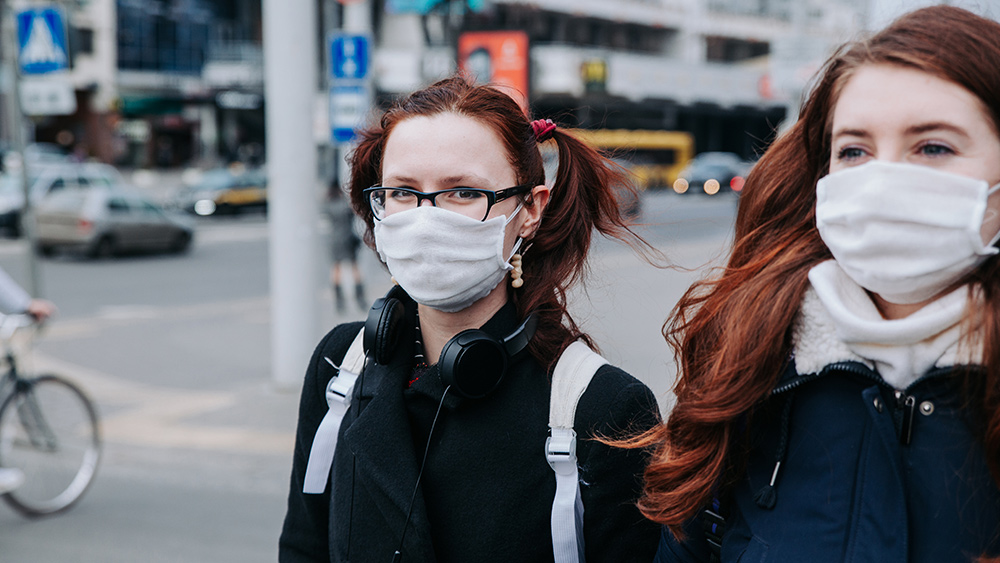5 Small steps you can take to protect yourself and your family from COVID-19
05/22/2020 / By Divina Ramirez

With experts still scrambling to develop a viable cure or a potential vaccine for COVID-19, different so-called solutions to beat the disease have started cropping up.
From vinegar to radiation, professionals of all shapes and sizes have touted a host of products and practices alleged to be effective against the dreaded COVID-19.
With each passing week, there seems to be a new and improved instant “fix” to the disease. That said, most if not all of these fixes are often proven to be ineffective and based on no scientific evidence whatsoever.
How to prepare for COVID-19
With the pandemic still ongoing, COVID-19 remains an active area of research. Scientists are moving at a snail’s pace when it comes to understanding the new coronavirus, but it cannot be helped.
What can be helped, on the other hand, are our bodies. As with most infections and diseases, a person is more susceptible to pathogens if he or she isn’t fit to begin with. While it’s true that the virus can still latch onto the healthiest individuals, watching out for certain biomarkers of poor health can afford us time to turn things around before it’s too late.
With that, here are some helpful tips to follow in preparation for COVID-19:
Watch out for signs of diabetes
According to recent reports from the International Diabetes Federation (IDF), older people and people with pre-existing medical conditions like diabetes and heart disease are more vulnerable to severe complications linked to COVID-19.
One reason for this is that infections tend to be harder to cure in general for people with diabetes due to fluctuations in blood glucose levels and the presence of diabetes complications. People with chronic diseases like diabetes also tend to be immunocompromised, thus making them more susceptible to contracting COVID-19.
If you haven’t been diagnosed with prediabetes or diabetes, some signs to watch out for include increased thirst, frequent urination, sudden weight loss, blurred vision, slow-healing wounds, tender gums and frequent infections.
Avoid foods that raise cholesterol and blood pressure
Heart health depends on two major factors: cholesterol and blood pressure. Excess cholesterol can lead to clogged arteries, increasing the risk of heart attack, stroke and heart failure. High blood pressure, on the other hand, often leads to arterial stiffness, another major biofactor for heart disease.
Like diabetes, heart disease makes a person more susceptible to severe complications related to COVID-19. People with heart disease tend to be weaker in general due to poor blood circulation. To support heart health, avoid the following foods: pastries, processed meat, red meat and canned foods.
Quit smoking
The new coronavirus targets the lungs, so quitting or refraining from smoking should be a no-brainer. Still, a recent review published in Tobacco Induced Diseases established that smoking is associated with the negative progression and adverse outcomes of COVID-19.
In particular, smoking can exacerbate complications linked to pneumonia and the flu, two infectious diseases with symptoms similar to those of COVID-19. These complications include wheezing, shortness of breath, chronic coughs, chest pain and fever.
Exercise often
There is no conclusive evidence that being fit reduces the risk of contracting COVID-19, but recent studies show that exercise helps strengthen immune functions.
Exercise, in particular, can help flush out bacteria and other pathogens from the lungs, thus reducing the risk of catching a cold, flu and other similar infections.
Exercise also stimulates antibodies and white blood cells to work harder, resulting in the better detection of harmful pathogens. The rise in temperature after a period of exercise can also inhibit bacterial growth in the lungs.
In addition, exercise helps reduce cholesterol and regulate blood pressure.
Lose weight
Overweight individuals are at an increased risk of chronic diseases like diabetes and heart disease. As discussed earlier, conditions like these can compromise an individual’s immune functions and make them more susceptible to COVID-19.
As such, it’s important to follow a balanced diet. Diabetic or obese individuals can take it a step further and follow a plant-based diet. This diet can include animal products, but a large chunk of it should be comprised of fruits, vegetables, whole grains, nuts, fish and olive oil.
Coupling a balanced diet with regular exercise can also help burn excess weight and reduce the risk of chronic diseases.
Maintaining a healthy body and a strong immune system greatly reduces your risk of catching COVID-19. (Related: Strengthen the immune system with these 12 superfoods.)
Learn more about the ongoing COVID-19 pandemic at Pandemic.news.
Sources include:
Submit a correction >>
Tagged Under:
anti-diabetes, anti-obesity, coronavirus, diet, disease treatments, exercise, fitness, heart health, immune system, prevention, stopsmoking, weight loss
This article may contain statements that reflect the opinion of the author
RECENT NEWS & ARTICLES
COPYRIGHT © 2017 NATURAL MEDICINE NEWS





















